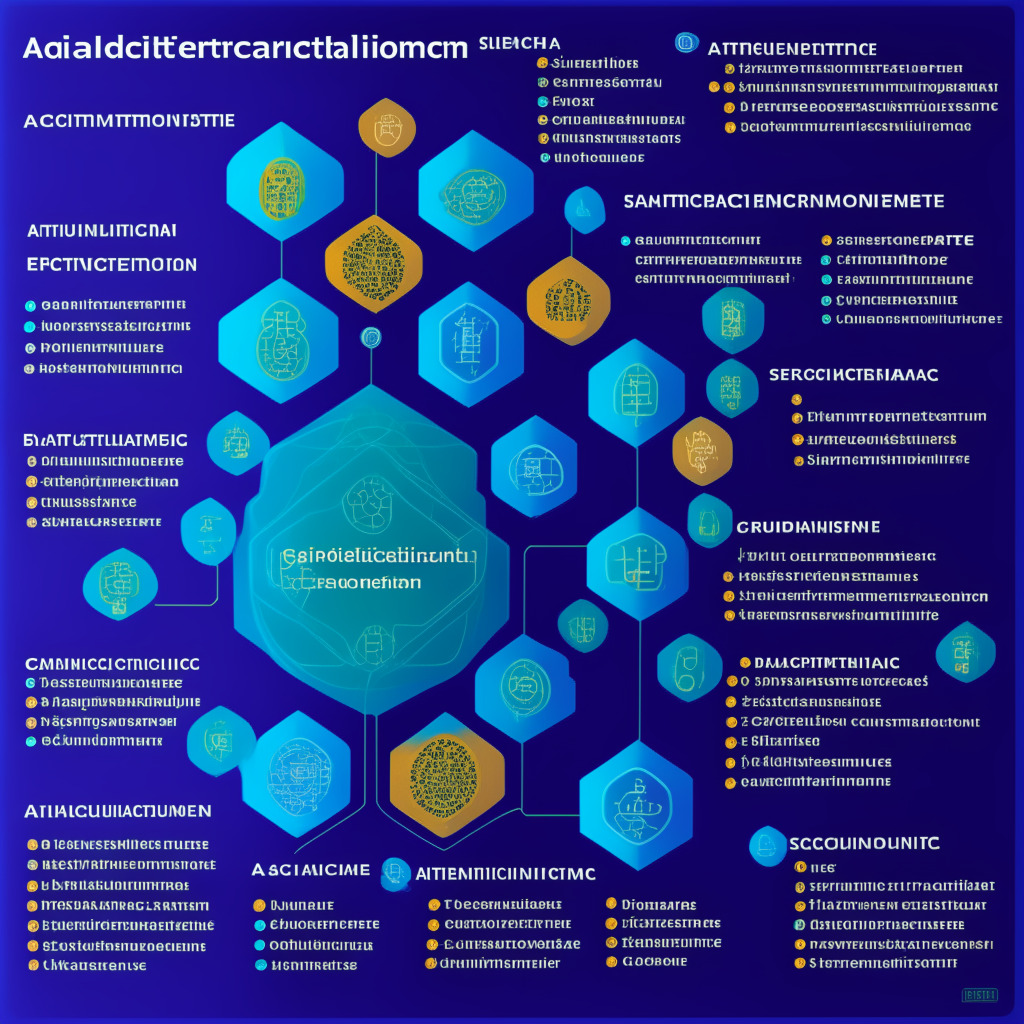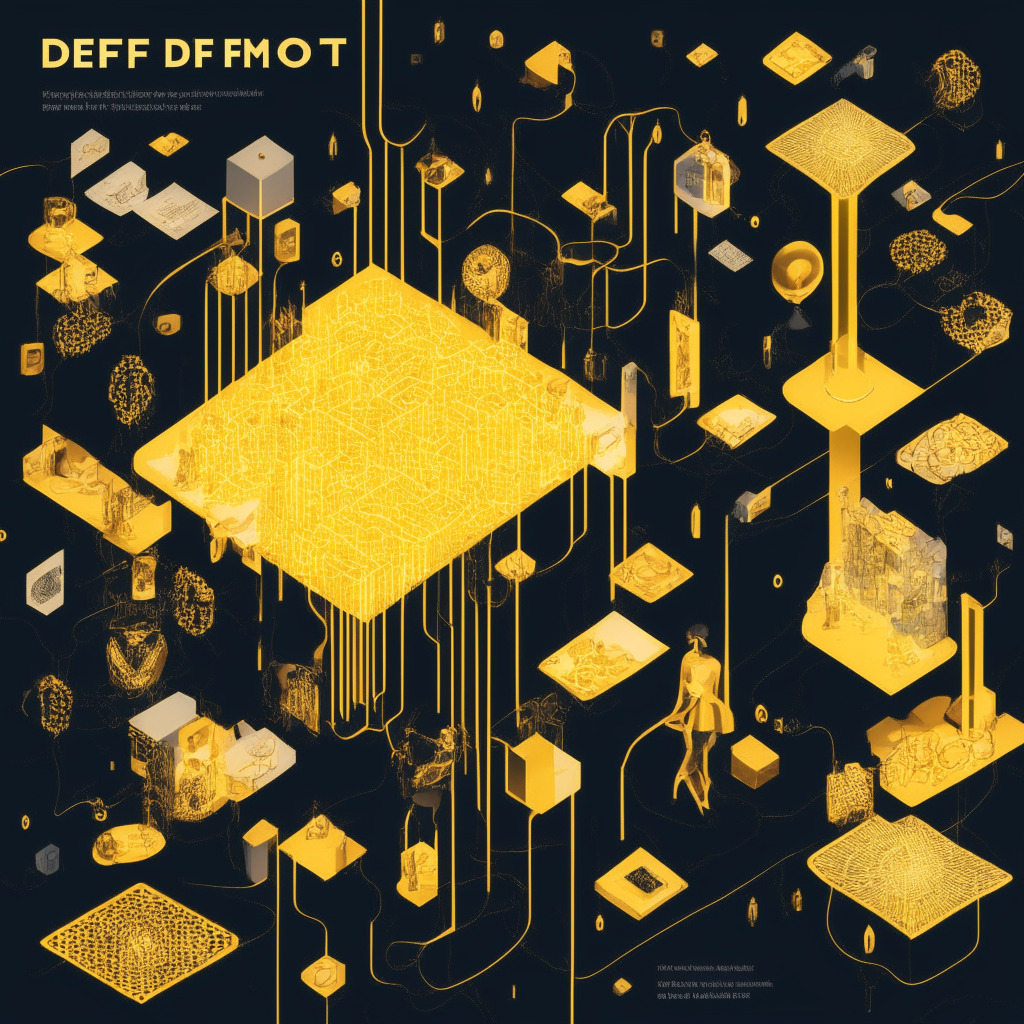“Ryan Wyatt, former gaming head at Google and YouTube, outlines AI’s role in the gaming industry. While not a replacement for tasks, AI will aid game teams to accomplish more. Wyatt sees blockchain’s potential in game development and its necessity in holding accountability over AI advancement due to its transparent, reliable nature.”
Search Results for: Provenance Blockchain
Blockchain Boom: Story Protocol’s IP Ownership vs. Coinbase’s Crypto Lending Battle
“Story Protocol is using blockchain technology to empower content creators and oversee their content, countering falsified AI-generated content. Meanwhile, Coinbase has launched an institutional-grade crypto lending platform, Coinbase Prime. These high-value projects symbolize the maturing crypto technology space.”
Decoding the Story Protocol: A Blockchain Revolution in Intellectual Property Management
Story Protocol, a startup using blockchain technology to track intellectual property (IP), has secured over $54 million in funding. The platform aims to democratize IP creation with a universally adaptable IP vault, streamlining the complex processes in maintaining IP, especially in the context of generative AI.
AI and Blockchain: Harmonizing the Future of Music Industry or Hitting the Wrong Note?
“The rise of AI and blockchain in the music industry could shift power dynamics and reshape creativity. AI is at the forefront of content creation, blurring lines between imitation and originality. Blockchain technology, touted for transparency, can ensure fair copyright practices and compensation while providing a clear lineage of music content.”
Preserving Cultural Heritage with Blockchain: Exploring the Potential of Salsal
“Salsal, a Web3-based verification-as-a-service model, bridges the gap between historical artifacts and an unalterable on-chain validation system. It aims to identify, grade, and record information about artifacts, transforming them into non-fungible tokens (NFTs). An immutable blockchain-based registry could deter theft and illegal extraction, preserving humanity’s priceless cultural artifacts.”
Unmasking Blockchain’s Role in East African Agriculture: Promising Rise or Insurmountable Challenge?
“East African farmers are exploring blockchain technologies to gain international clients. Meanwhile, blockchain’s immutable nature, vital for proving adherence to ethical practices to international clients, has led AgTech firm Dimitra and One Million Avocados to improve Kenyan farming practices. However, skeptics cite challenges with technology absorption and shifting traditional farming practices.”
Bolstering Blockchain: The Integration of ZK Proofs in Cryptographic Technologies
This article discusses the partnership between Paris-based =nil; Foundation and Fabric Cryptography as they work together to enhance cryptographic technologies and accelerate the deployment of zero-knowledge (ZK) proofs – a cryptographic procedure with substantial privacy-preserving attributes. They aim to overcome barriers in computation, making ZK proofs more functional for digital transactions, cloud services and privacy applications.
The Phygital Revolution: Bridging the Gap Between Fashion, Music, and Blockchain Technology
“Blockchain and digital assets company, Legitimate, has partnered with PUMA and Roc Nation to develop an exclusive sneaker collection that merges music, fashion, and blockchain technology. Their ‘phygital’ approach also incorporates NFC chips to deliver unique content and foster strong bonds between brands and customers.”
Celebrity Impact on NFTs: Snoop Dogg, Coldie, and the Future of Blockchain Art
In this article, visual artist Coldie’s journey in the NFT space is explored, from his iconic creations to collaborations with influential figures like Snoop Dogg. The piece highlights the impact of blockchain technology, its growing adoption, and the challenges artists face in a rapidly evolving digital landscape.
Louis Vuitton’s Via Treasure Trunks: Luxury NFTs Meet Blockchain Limitations
Louis Vuitton’s Via Treasure Trunks collection introduces physical-linked NFTs in the luxury retail industry. By purchasing these exclusive digital trunks, customers gain access to future products, immersive events, and the brand’s growing blockchain initiatives. However, the non-transferable nature of these NFTs raises questions about resale potential and broad market impact.
AI and Blockchain: Unlocking Societal Challenges and Crypto Opportunities
AI and blockchain technology convergence offers immense opportunities for entrepreneurs to tackle societal challenges and create innovative use cases in the crypto space. Decentralized data marketplaces, token-based incentives, and computational power from decentralized networks can improve AI models and address issues like algorithmic bias and digital identity verification.
Exploring AI and Blockchain Synergy for a Decentralized Digital Future
A recent tweet claiming that 90% of web3 companies have pivoted to AI raises the issue of misunderstanding the interconnected relationship between technologies like blockchain and AI. Blockchain offers valuable solutions to AI’s challenges, and integrating diverse technologies and intelligent legislation will be key to shaping our digital future.
Balancing AI Advancements with Blockchain for Ethical Future
Blockchain technology offers transparency, traceability, and trust, which could offset some opaqueness associated with AI. Integrating blockchain may enhance transparency in AI models and ensure responsible AI governance standards, providing accountability and promoting ethical practices amid growing concerns about AI’s societal impact.
DeFi vs NFTs vs Market Influencers: Debating Blockchain’s Revolutionary Impact and Controversies
In this article, the author discusses the surge in decentralized finance (DeFi) projects, controversial role of nonfungible tokens (NFTs), Elon Musk’s influence on cryptocurrency markets, the debate surrounding responsible regulation, and cryptocurrency exchange advancements. Crypto enthusiasts keenly follow these topics, witnessing innovation and history in the making.
Apollo’s Bold Move into Crypto: Acquiring Celsius and Impact on Blockchain Future
Apollo Global Management, overseeing over $500 billion in assets, is reportedly bidding to acquire troubled cryptocurrency lender Celsius. This represents a significant incursion of traditional finance giants into the digital asset realm. If successful, Celsius plans to mine Bitcoin, participate in Ethereum staking, and issue blockchain-based security tokens.
Everledger’s Financial Struggles: A Cautionary Tale for Blockchain Supply Chain Startups
Everledger, an Australian blockchain company focusing on tracking the provenance of diamonds and goods, faces financial trouble after failing to secure new funding. Placed into voluntary administration, the firm’s insolvency persists despite backing from major investors like Tencent.
Blockchain’s Future Potential: Trust and Innovation vs. Scalability and Environmental Concerns
Blockchain technology has the potential to disrupt traditional markets and increase trust and transparency with decentralized, secure transactions. Despite challenges like scalability, environmental impact, and regulatory obstacles, its implementation across various industries shows promise for a transformative future.
Blockchain’s Role in Balancing AI Growth: Decentralization vs Dominance Dilemma
Blockchain technology has the potential to manage aspects of AI development like data accessibility, incentivization, and decentralization. By creating decentralized systems, blockchain can prevent control of AI development from concentrating in monopolies and establish public trust, while ensuring secure data management and contributing to AI’s responsible growth.
The Evolution of Total Value Locked (TVL) in DeFi: The Impact of Tokenized Real-World Assets
As decentralized finance or DeFi matures, the concept of total value locked (TVL), which represents the amount of money in a specific protocol, now includes tokenized real-world assets (RWAs), broadening understanding of on-chain assets. RWAs, including private equity, mortgages, and illiquid funds, are now incorporated within this framework, making DeFi more appealing to large-scale investors. However, limited availability of segmented and classified RWA TVL data remains a challenge.
Hedera Hashgraph HBAR: A Micropayment Powerhouse Attracting Market Attention or a Fleeting Trend?
“Hedera Hashgraph’s HBAR token sees over 15% surge following the inclusion of Dropp, a Hedera-based micropayments platform, on the FedNow. HBAR’s unique use of hashgraph consensus permits over 10k transactions every second. Its growth also aligns with a 288% jump in daily active accounts and a notable spike driven by non-fungible tokens (NFTs).”
OKCoin’s FDIC Misstep: What It Means for Crypto Consumer Protection and Industry Transparency
The U.S. FDIC issued a demand to cryptocurrency exchange OKCoin for misleading statements suggesting FDIC protection on customers’ accounts. This highlights the need for accurate communication and transparency, as well as adherence to regulations, in the rapidly evolving crypto industry.
Apollo-backed NovaWulf Bids for Bankrupt Crypto Lender: Market Shift or Risky Venture?
Apollo Global Management, a leading private credit investor, has partnered with crypto investment firm NovaWulf in a bid to acquire bankrupt crypto lender Celsius Network. With support from a consortium that includes Gemini Trust, the acquisition aims to restructure and rescue the lender using blockchain technology, amidst concerns about security and trust in the platform.
Harnessing the Power of Tokenization: Future of Asset Management and The Uncertainties Ahead
“Tokenization, referring to the conversion of asset ownership rights into digital tokens on a blockchain, is revolutionizing securitization according to Jenny Johnson, CEO of Franklin Templeton. It opens up new possibilities for alternative investment vehicles with its incorporation of a payment mechanism, programmable smart contracts, and a source of truth embedded in a decentralized ledger.”
FTX Founder Sam Bankman-Fried’s Legal Duel: Ethics, Law, and the Crypto Future
“FTX founder Sam Bankman-Fried faces serious charges including securities fraud, wire fraud, and money laundering. Allegations of bond violation and witness tampering are under scrutiny. His troublesome situation serves as a stark reminder of the importance of upholding rules and integrity in the ever-evolving crypto industry.”
NFTs and Art Collecting: Challenging the Conventional Paradigm with Mystery Artists
“Art collecting sees a shift with NFTs disrupting conventional paradigms and putting emphasis solely on art, not artists. Through blockchain technology, tokenized art is promoting unique speculative tendencies among collectors. Companies like Amazon Prime are also marking their entry into the NFT realm.”
Web3 Investments: Hedge Against Tech Disruption or Hype? Exploring the Truth Behind the Trend
Web3 investments serve as a potential hedge against tech industry disruption, despite regulatory challenges and market downturns. Investors increasingly back Web3 and DeFi startups, seeking genuine value in solid projects. Though overcoming reputational and regulatory obstacles remains crucial, the future of blockchain, AI, and crypto-driven industries appears promising.
European DeFi Startups Boom: Unraveling the Web3 and AI Investment Phenomenon
European DeFi startups witnessed a 120% increase in VC funding in 2022. Investing in Web3 is considered a “hedge against disruption,” with generative AI driving interest in the space. However, regulatory challenges and the crypto market’s volatility raise concerns about the potential integration of blockchain and AI.
Merging Automotive Giants and NFTs: Mercedes-Benz, Fingerprints DAO, and Generative Art
Fingerprints DAO partners with Dutch artist Harm van den Dorpel and Mercedes-Benz for a generative art NFT collection called “Maschine.” This collaboration demonstrates the potential of blockchain technology in shaping the future of digital art, distribution, and authentication.
BRC-721E: Bridging Ethereum NFTs to Bitcoin’s Ordinals – Future Potential and Challenges
The new BRC-721E token standard facilitates the migration of Ethereum-based NFTs onto Bitcoin, transforming ERC-721 NFTs into Ordinals. This allows users to transfer digital collectibles from Ethereum to Bitcoin using a bridging contract while preserving essential metadata and provenance.
Revving Up the NFT World: Mattel’s Hot Wheels Garage Series, Pros and Cons
Diving into the digital age of collectibles, Mattel’s Hot Wheels NFT Garage Series Fast & Furious edition launches on May 22nd, residing on the Flow Blockchain. Offering exclusive digital car collections and strengthening the connection between tangible and digital realms, NFTs provide a revolutionary approach to verifying ownership of digital assets. However, sustainability and long-term value remain uncertain.
Ethereum Attestation Service: Boosting Trust in Optimism’s Ecosystem & Potential Drawbacks
Ethereum-based layer-2 blockchain Optimism has integrated Ethereum Attestation Service (EAS) to enable users to assess trustworthiness on the platform. The on-chain attestation protocol promotes fairer distribution of Optimism’s native OP tokens and community voting systems. EAS has potential applications in identity platforms, supply chains, reputation scoring in DeFi, and promoting transparency in the Optimism ecosystem.






























